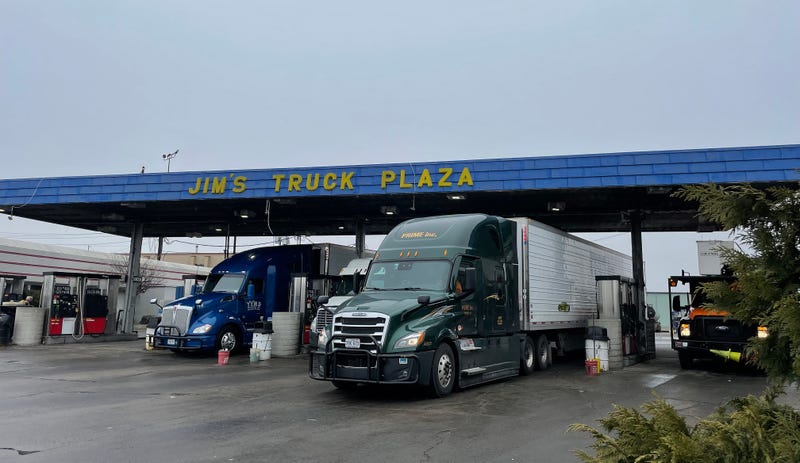
Cheektowaga, N.Y. (WBEN) - The price of gasoline continues to rise drastically across the country, with the effects also being felt in Western New York.

According to AAA, gas prices in Erie County are averaging $4.42 per-gallon for regular unleaded fuel, with prices in the Buffalo-Niagara Falls region averaging $4.40 per-gallon. As for diesel fuel, the cost for an average gallon is well-above $5 at an average of $5.21.
Not only has the soaring prices of gas made an impact on the wallets of Americans all across the country, it has taken its toll on the trucking industry.
"The biggest impact is getting the customers to agree to pay higher prices for us to keep making money with the cost of fuel," said local trucker Travis, while filling up his truck on Friday at Jim's Truck Stop in Cheektowaga. "People don't like to see their costs go up, but we're putting more money into our trucks to get you the same goods and they want the same price."
"It has a dramatic impact, because usually when it holds a steady price, you can budget it, and you can figure out per-mile, per-how many gallons so you can adjust your fee for charging for your loads," adds local trucker Bob Morehouse on Friday. "Then there's a surcharge, if you need to get extra fuel that they add to it and stuff. Well now that it keeps jumping, if you go out and pick up a load, like say last week out in the west coast, by the time you get over here, your fuel mileage has changed per-dollar wise, and then the next thing you know, you're coming up short on cash. So you've got to watch what you're adjusting, and you got to try to keep with it, and it makes it very difficult to do that. It's very hard.
"I mean, even being a local guy. I don't pay the fuel for this - my company does - but even still, these trucks get 8-9 miles to a gallon, where your car gets 15-20. There's a big difference there. But then when you look at the weight wise, we're hauling seven of your vehicles in one load. So it's a very hard thing to do and hard to keep track of."
As the price at the pump continues to rise everywhere, so does the average cost of filling up a tank, or multiple tanks of gas for truckers.
For Travis, depending on the routes he takes, he says he has to fill the tanks for his truck almost every day. Travis says he has smaller gas tanks on his truck, which could now cost around $800 to fill.
"You're usually putting in $200 more, 50-cents a gallon more than what you're usually putting in. At 200-300 gallons, it adds up," Travis said.
As for Morehouse, he paid nearly $500 at the pump to fill up his truck on Friday, which is quite a jump from what he used to pay. Morehouse has been trucking since 1977, and he says this rate of jump for gasoline is the most outrageous jump he's seen.
"I remember when it was pushing $4 [per-gallon] a while back, but the way it keeps jumping nowadays is just very unusual. I shouldn't say unusual, it's just crazy, really," he said.
Luckily for Morehouse, he is primarily trucking locally in Western New York, so his trips to the gas stations have not been as frequent as other truckers, like Travis.
"I fill it up by about once a week, maybe just shy of a week, depending on where I got to go and how much running I got to do. So it's about a once a week fill up that I do," Morehouse explained.
With the rise in prices for Morehouse, he says he's doing more watching around for places where he can and cannot go for fuel. He says he has to stick mainly to the truck stops, because his truck is too big to pull in some places that may have cheaper gas prices.
While the price at the pump has had an impact on the truckers themselves, Morehouse believes it has had a trickle down effect on the consumers, who often have goods that they have purchased on the trucks that are being transported from Point A to Point B.
"The produce makers are trying to get away with it. I mean, I feel bad for farmers. 90% of their equipment is all diesel operated. There's very little gas on a farm. They've got to incur their cost, then it goes to the trucker, who's got to incur the costs, which, in turn, is going to go down to the consumers. That's why everything's going up," Morehouse said. "Your produce is going to go up, your furniture is going to go up. I can't think of anything that won't go up because of the price of fuel. Rubber is made out of oil, too. Tires are going to go through the roof, even belts, fan belts for cars and trucks. Anything that's going to touch oil is going to go right to the roof. I just can't get it."
So what efforts are being made to try and lower the cost at the pumps, particularly in New York State? One possible solution from State Legislation has been to suspend the state's gas tax, which is a 48-cent per-gallon gas tax.
"I'm all about taking a look at lowering gas prices any way that we can. That's certainly something that we're looking at. It's on the table," Senator Tim Kennedy said in a brief statement on Friday. "One of my colleagues introduced a bill to eliminate the gas tax in the State of New York through the end of the year. That's certainly something that we should be looking at, and I'm fully supportive of that. What we have to do is lower gas prices any way possible. Unfortunately, what's happening in Western Europe with the terrorist [Vladimir] Putin invading Ukraine is having a disastrous effect on oil prices across our nation and across the globe, and we have to do everything that we can to alleviate that burden on the people of this country and across the world."
While it is unclear as to when this possible bill from the state could be passed, truckers are hoping for some sort of relief at the pumps in the near future.
"The best answer: Start drilling American oil," Travis said of a possible solution. "Open the oil fields back up in the United States and support our country, instead of supporting other countries."
As for Morehouse, he's hoping, at the very least, that the prices at the pump start to come to a standstill instead of continue to rise at insane rates.
"This way, we can set our sights on what we need to do, and how we can adjust our your load mileage, our load freight and stuff like that," he said. "Being that we're hoppin', you're afraid to take a long haul. You try to short haul, so you can keep up with the fuel cost. And when we can't do it that way, then we have to start looking at surcharges. It just doesn't make sense.
"I can't understand why it's jumping so much in such a short time. It's not like we don't have any fuel. It's not like we have to buy it every day. I'm sure they've got some kind of budget of how they do it, but I'm not in government, so what can I say?"

